Overview
The article delves into the emotional challenges that healthcare providers face, particularly in the context of Duke AI product management's role in fostering innovation through human-centered AI solutions. It highlights the significance of collaboration between technical teams and medical providers, emphasizing that addressing these emotional hurdles is crucial for improving patient care.
How often do administrative burdens overshadow the compassionate care that patients deserve? By recognizing and alleviating these pressures, we can enhance operational efficiency and ultimately lead to better medical outcomes.
This collaborative approach not only nurtures a supportive environment but also paves the way for innovative solutions that resonate deeply with the needs of both providers and patients.
Key solutions include:
- Improved communication between teams
- Streamlined processes to reduce administrative tasks
- Focused training on emotional intelligence
By embracing these strategies, we can create a healthcare landscape that prioritizes empathy and understanding. Let’s work together to foster an environment where both providers and patients thrive.
Introduction
In the rapidly evolving landscape of healthcare, the integration of artificial intelligence is more than just a trend; it represents a transformative force that reshapes how care is delivered. Have you ever felt overwhelmed by the administrative burdens that distract from patient care? AI technologies are here to help streamline these tasks, allowing healthcare providers to focus on what truly matters—their patients.
As we explore the multifaceted role of AI in healthcare, it’s important to recognize its potential to enhance efficiency and improve patient outcomes. Imagine a world where technology not only supports healthcare providers but also fosters deeper connections with patients. However, with this innovation comes the necessity for ethical considerations and a focus on patient-centered approaches. How can we ensure that these advancements prioritize the needs and well-being of those we serve?
As organizations strive to harness the power of AI, understanding the challenges and opportunities that accompany this shift is crucial. This journey is not just about technology; it’s about creating a compassionate healthcare environment. Let’s delve into how we can navigate the ethical complexities inherent in this new era of medical practice and work together to embrace the future of healthcare with empathy and understanding.
CosmaNeura: Transforming Healthcare with AI-Driven Administrative Solutions
In today's demanding healthcare environment, many providers face overwhelming administrative tasks that can detract from their ability to connect with patients. CosmaNeura recognizes these emotional challenges and is committed to making a difference. By offering that automates administrative duties, CosmaNeura helps primary providers streamline client intake, administration, and triage processes.
This innovative solution not only alleviates the administrative burden but also allows medical professionals to focus on what truly matters: providing compassionate care. Imagine regaining precious time to engage with patients, offering them the empathetic support they need. Furthermore, this transformation aligns with Catholic teachings, ensuring that ethical practices are upheld in the delivery of medical services.
With CosmaNeura, healthcare providers can enhance their operational efficiency while nurturing their relationships with patients. By embracing this platform, you can reclaim valuable time for interaction and support, ultimately enriching the patient experience. Are you ready to explore how CosmaNeura can transform your practice and allow you to focus on what you love most—caring for your patients?
Duke AI: Pioneering Product Management Strategies for Healthcare Innovation
Duke AI product management is at the forefront of innovation in the medical field, demonstrating a heartfelt commitment to developing human-centered AI solutions that significantly enhance individual well-being. Healthcare providers often face emotional challenges, particularly when conventional accelerators fall short in supporting medical startups. These startups encounter unique obstacles, especially in engaging physicians who may be hesitant about innovations that could impact patient care, but Duke AI product management helps foster collaboration between technical teams and medical providers through the use of data science and industry best practices. This approach ensures that AI tools are not only effective but also intuitive and user-friendly. Such cooperation is vital for nurturing innovation and improving medical outcomes, as it aligns technological advancements with the genuine needs of clinicians and patients alike.
As we look toward 2025, prioritizing human-centered design in is more critical than ever. This focus is particularly important in overcoming the resistance to innovation often encountered from medical professionals. By addressing doctors' concerns about the implications of AI in healthcare, including perceived risks associated with its implementation, Duke AI product management enhances user adoption and satisfaction. Consider the impact: recent statistics show that successful Duke AI product management strategies in medical AI can lead to improved patient outcomes and operational efficiencies. This reinforces the importance of integrating user feedback into the development process. The strategies of Duke AI product management exemplify how thoughtful product management can transform medical service delivery, establishing a compassionate model for others in the industry.
Are we ready to embrace this change together? Join us in advocating for a future where technology and care go hand in hand, ensuring that every voice in healthcare is heard and valued.
Ethical AI Implementation: Balancing Innovation with Patient Care Values
Implementing AI in medical services presents a unique challenge. How do we embrace innovation while ensuring ethical considerations are met? It's essential that providers respect individual privacy, promote equity, and actively work to mitigate biases. Creating moral principles is not just a formality; it’s crucial for building trust between patients and healthcare professionals.
By prioritizing ethical AI practices, medical organizations can enhance their reputation significantly. This commitment not only aligns with patient care values but also fosters a nurturing environment where individuals feel safe and respected. Imagine a healthcare system where coexist, supporting both providers and patients alike.
Let’s consider the benefits of ethical AI:
- Improved patient trust
- Enhanced care quality
- A more equitable healthcare landscape
By engaging in this vital conversation, we can pave the way for advancements that truly reflect our commitment to patient care. How can we work together to ensure that technological innovations serve as a bridge to better health outcomes for everyone?
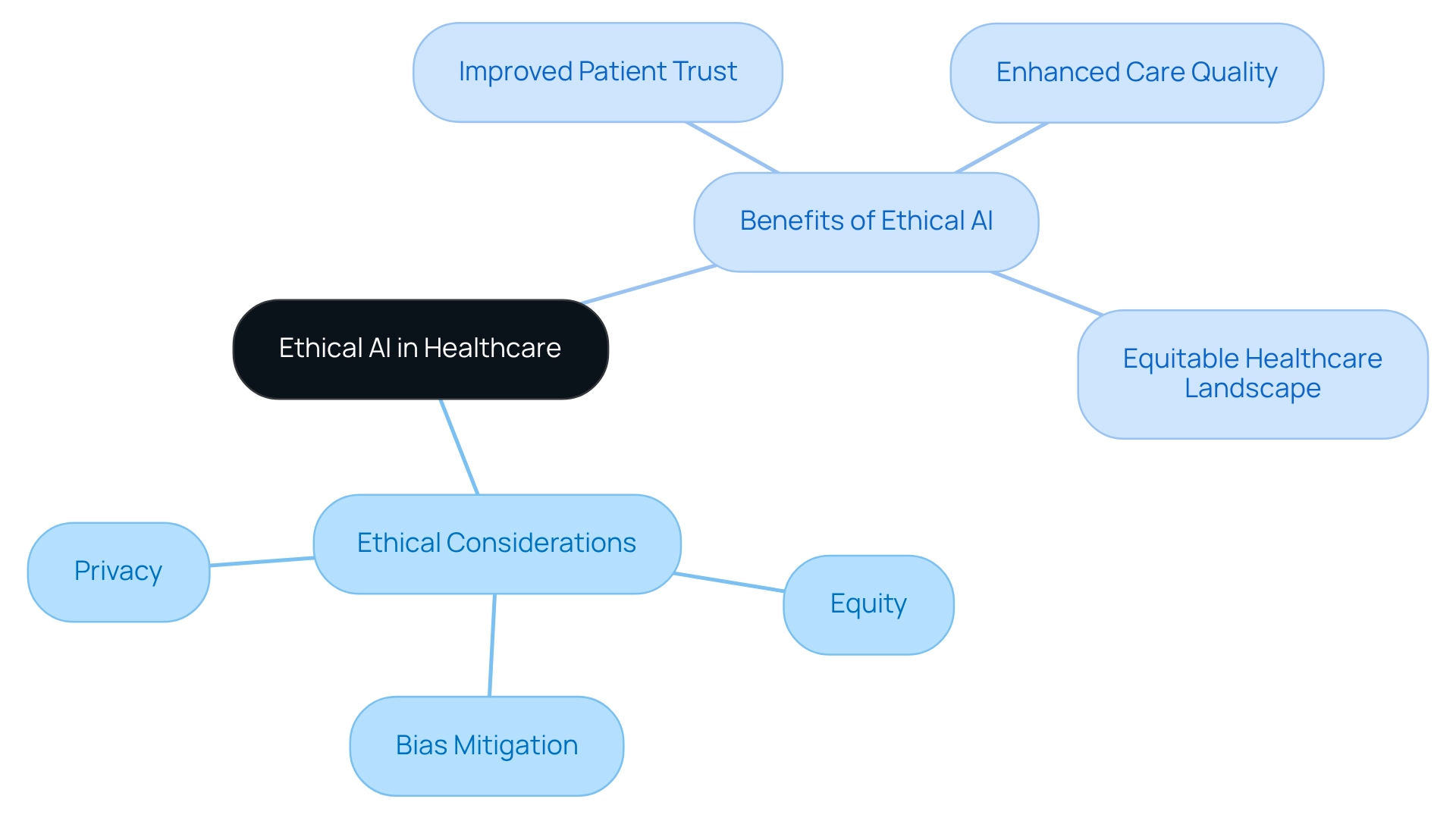
Integrating AI into Clinical Workflows: Enhancing Efficiency and Patient Outcomes
Incorporating AI into clinical workflows is essential for enhancing the delivery of medical services. Have you ever felt overwhelmed by administrative tasks? AI tools, such as automated scheduling systems, electronic health record (EHR) management, and billing software, can help. They automate routine tasks, streamline documentation, and assist in clinical decision-making. By embedding these AI solutions into existing workflows, healthcare providers can alleviate the burden of time-consuming administrative duties.
This automation not only lowers administrative burdens but also enhances interactions with individuals. Imagine regaining valuable time to focus on providing high-quality service. Additionally, AI's capability to analyze individual data enhances diagnostic accuracy and contributes to better outcomes. This means that patients receive improved care tailored to their needs.
Ultimately, integrating AI and results in better care for individuals. As you consider the potential of AI in your practice, think about how it can transform your daily workflows and enhance the patient experience. Let's explore these solutions together and create a more compassionate healthcare environment.
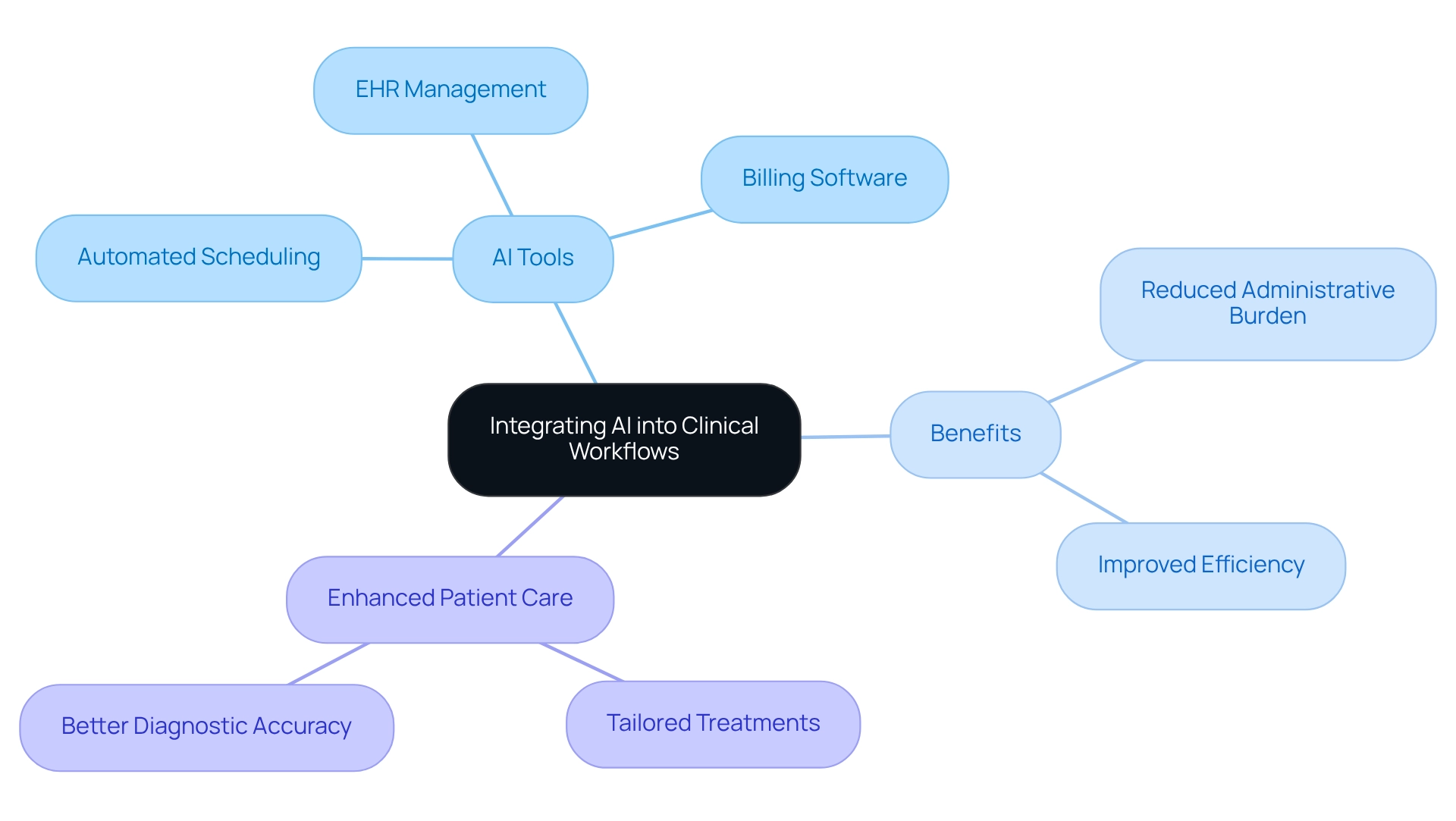
AI in Billing Optimization: Maximizing Revenue and Reducing Administrative Load
AI technologies are transforming billing optimization in the medical field, addressing the emotional and administrative challenges healthcare providers face. By automating coding and billing processes, AI can recommend accurate billing codes based on client interactions. This not only enhances revenue potential but also significantly reduces errors, allowing providers to focus more on what truly matters: patient care.
Imagine a world where administrative burdens no longer weigh heavily on healthcare professionals. Successful implementations of , such as integrating AI with electronic health records (EHR) systems, have shown improved accuracy in claims submissions. This integration ensures that billing codes are accurately assigned based on patient data, leading to fewer rejected claims and less rework.
In fact, AI's ability to analyze past revenue data is crucial for maintaining a balanced budget and avoiding financial challenges. Statistics indicate that AI will improve submission accuracy, further decreasing the frequency of rejected claims and rework. As medical organizations strive to enhance their financial well-being, integrating AI technologies into billing processes becomes essential for achieving sustainable growth and operational efficiency.
Moreover, investing in staff training is vital to ensure the effective use of AI tools in medical billing. By reducing coding mistakes and guaranteeing precise reimbursement, AI alleviates the emotional strain individuals experience from denied claims. This makes the overall experience more seamless for both healthcare professionals and individuals alike. Together, we can create a more compassionate and efficient healthcare environment.
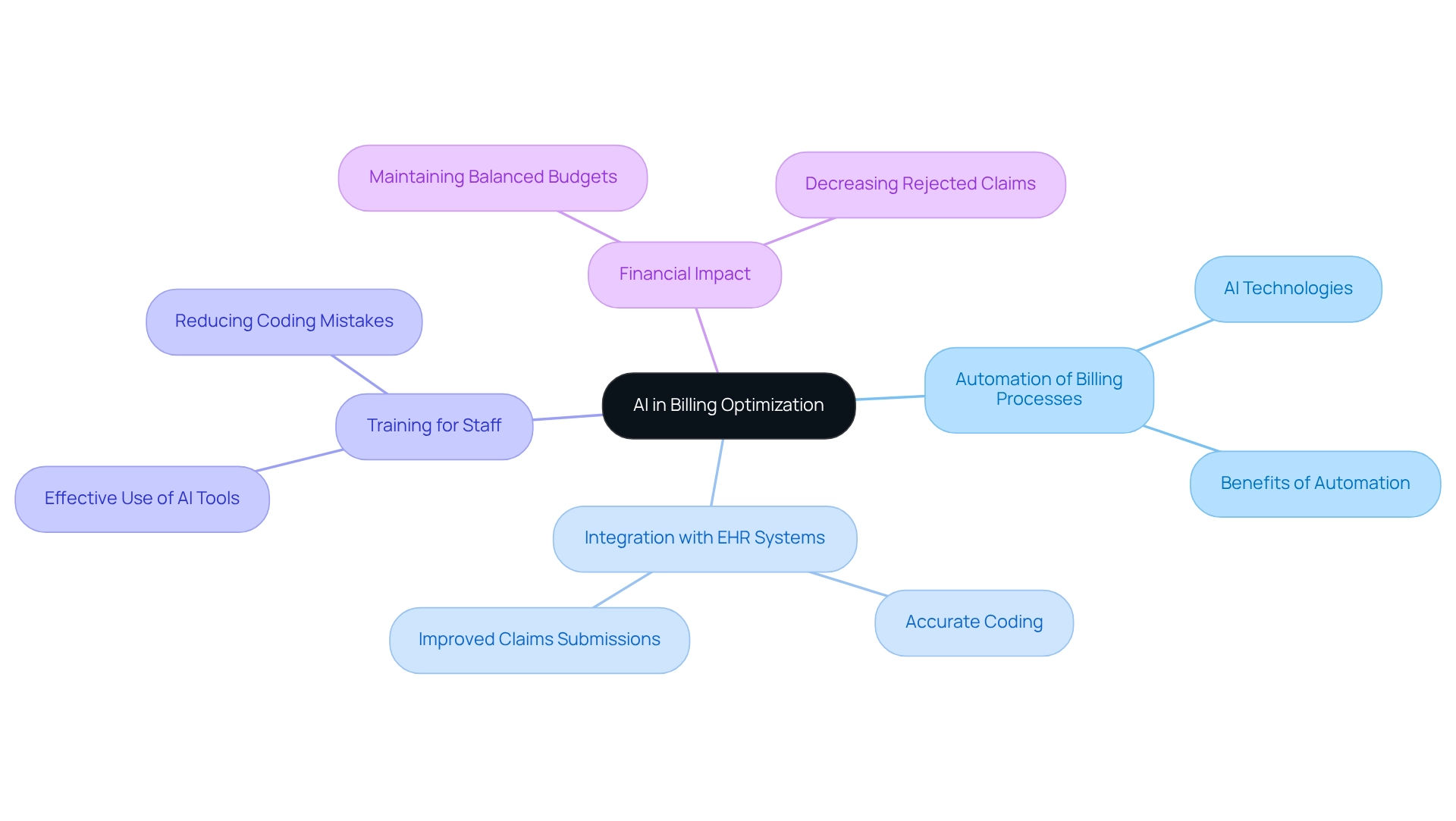
AI-Enhanced Telehealth: Improving Patient Interaction and Documentation
are truly transforming the way we connect. Imagine the relief of having real-time transcription and documentation support, allowing medical staff to focus entirely on their clients during virtual appointments. These tools not only ensure precise record maintenance but also boost the efficiency of service delivery, enhancing the overall experience for individuals.
Consider the burden of administrative tasks that often weighs heavily on healthcare providers. With the incorporation of AI, practitioners can more effectively manage these loads, facilitating deeper and more meaningful interactions with their patients. As telehealth continues to grow, embracing AI will be vital in upholding high standards of care and addressing the challenges of disjointed communication and coordination in the medical field.
How might your practice benefit from these advancements? By streamlining telehealth procedures, we can create a more compassionate and efficient healthcare environment. Together, let’s explore how AI can support your efforts in delivering exceptional care.
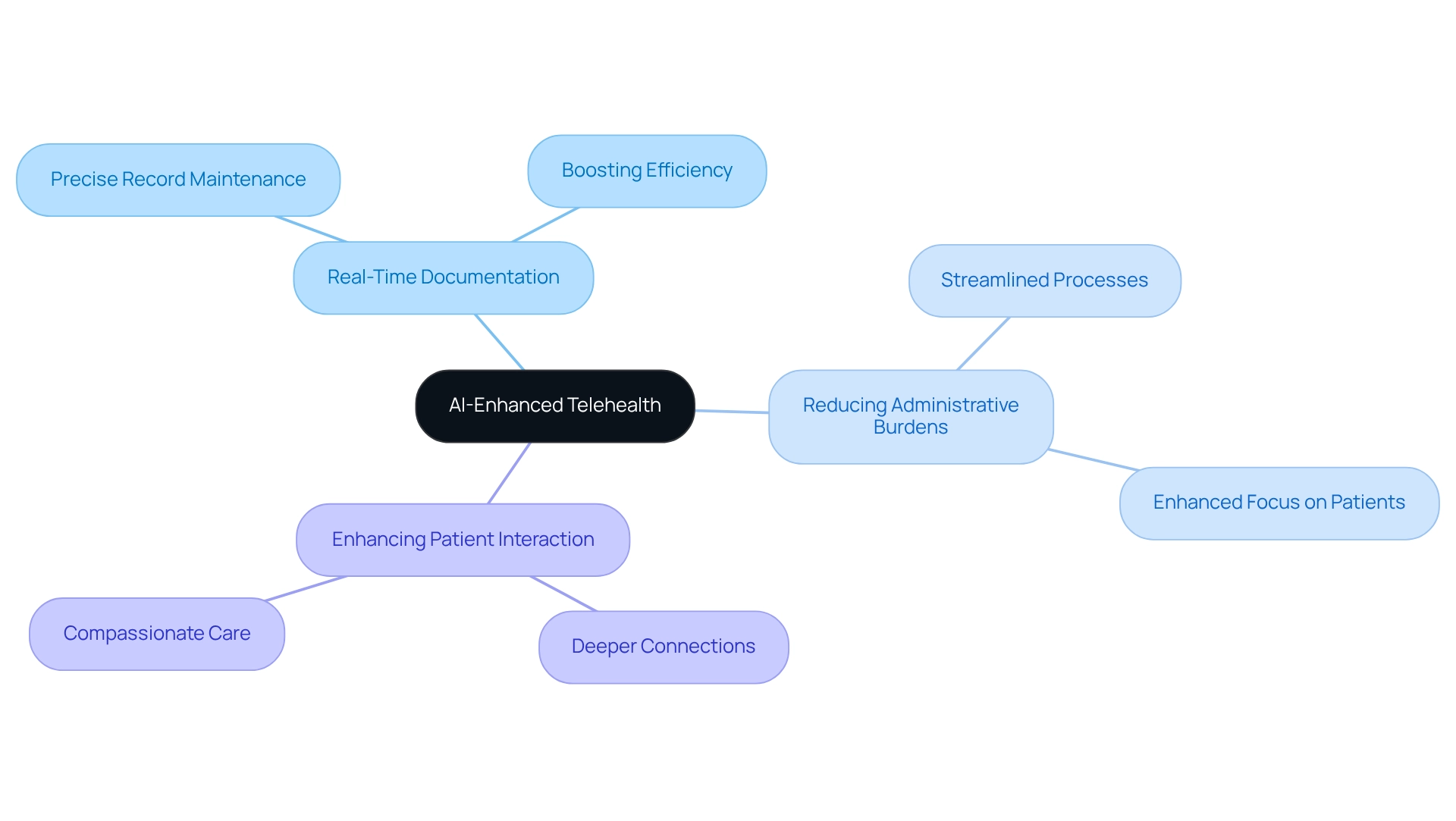
AI Diagnostic Guidance: Supporting Clinical Decision-Making for Better Patient Care
are emerging as invaluable allies in the challenging landscape of clinical decision-making. Have you ever felt overwhelmed by the myriad of choices in patient care? By thoughtfully analyzing client data and interactions, these tools can offer differential diagnostic suggestions, helping healthcare providers like you make informed decisions with confidence.
Moreover, with the integration of predictive analytics, AI can forecast disease progression and identify individuals at greater risk of developing specific conditions. This proactive approach not only enhances diagnostic accuracy but also enables timely interventions, ultimately improving patient care and outcomes. Imagine being able to anticipate the needs of your patients before issues arise.
As AI technology continues to evolve, its role in diagnostics will be crucial in shaping the future of medical care. Together, we can embrace these advancements to foster a more supportive and effective healthcare environment. Let’s explore how these tools can assist you in your practice, ensuring that every patient receives the compassionate care they deserve.
Future Trends in AI Product Management: Preparing for the Next Wave of Healthcare Innovation
The future of in medical services brings with it a wave of hope and potential advancements. Are you feeling the weight of administrative burdens that can impact patient care? Emerging trends, such as the integration of generative AI and enhanced data analytics capabilities, promise to alleviate some of these challenges. By focusing on user-centered design, we can create solutions that truly resonate with both providers and patients.
As medical organizations navigate these transformative changes, staying informed about technological advancements becomes essential. This knowledge is not just about keeping up; it’s about ensuring you maintain a competitive advantage in an ever-evolving landscape. Imagine being at the forefront of innovation, where you can leverage AI effectively to enhance patient care and streamline operations.
Preparing for this next wave of innovation is crucial. Together, we can embrace these advancements, fostering an environment that prioritizes patient well-being and provider efficiency. Let’s engage in this journey of transformation, where your insights and experiences shape the future of healthcare. How will you prepare to harness the power of AI in your practice?
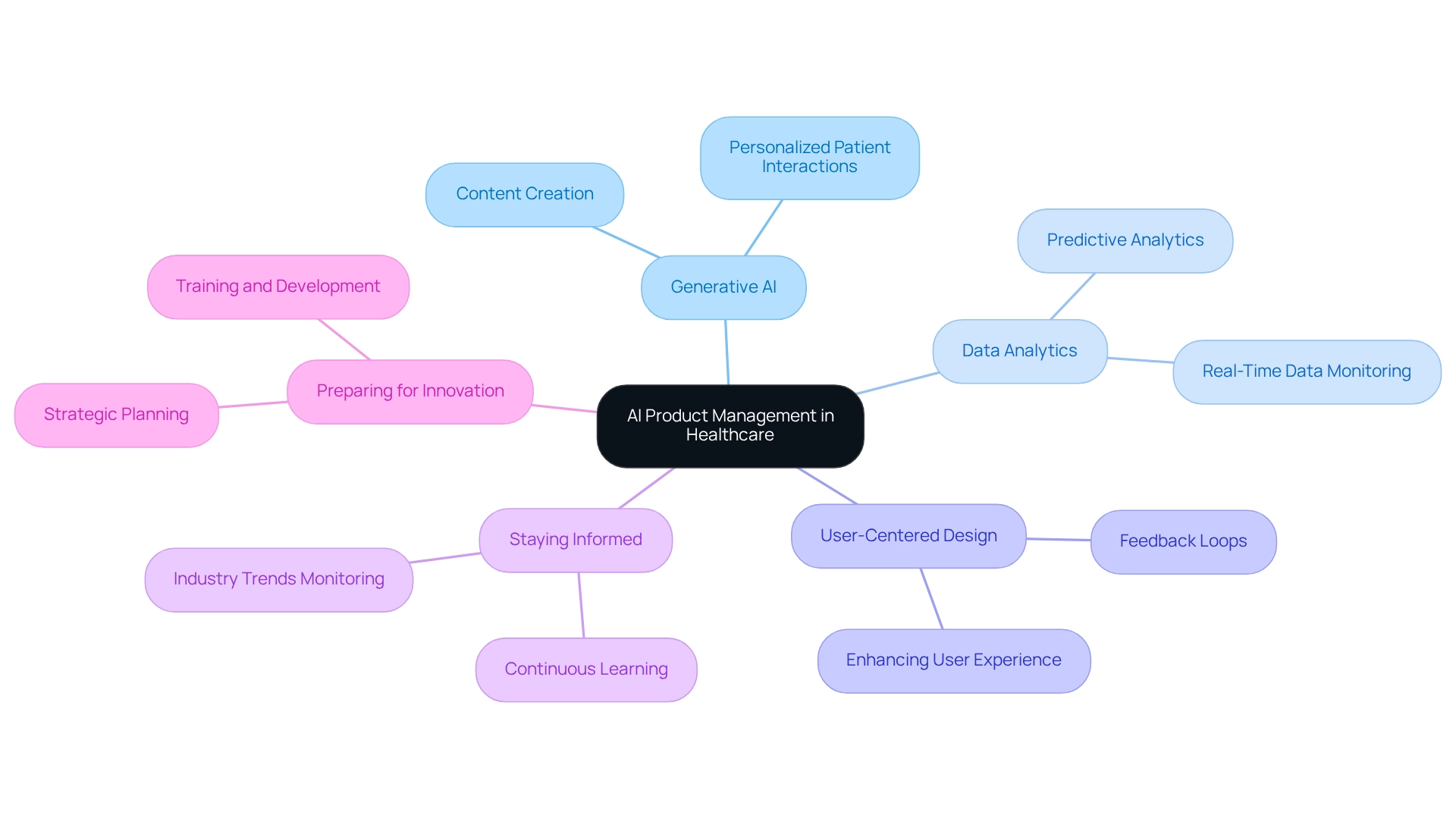
Challenges in AI Adoption: Navigating Barriers for Healthcare Providers
In the ever-evolving landscape of healthcare, of AI can feel both promising and daunting. Many healthcare providers grapple with significant challenges that hinder the adoption of these technologies. Data privacy concerns, integration issues with existing systems, and a lack of familiarity among medical professionals can create barriers that seem overwhelming.
It's essential to recognize these emotional hurdles. The administrative burdens that healthcare providers face can detract from their ability to deliver quality patient care. How can we alleviate these pressures? By prioritizing education and investing in robust data governance frameworks, organizations can create an environment where innovation thrives.
Imagine a healthcare setting where professionals feel empowered and informed. Overcoming these obstacles is not just beneficial; it is crucial for unlocking the full potential of AI in medical services. Together, we can foster a culture of innovation that not only enhances operational efficiency but also enriches patient care. Let’s take these steps forward, supporting each other in this journey towards a brighter, more effective future in healthcare.
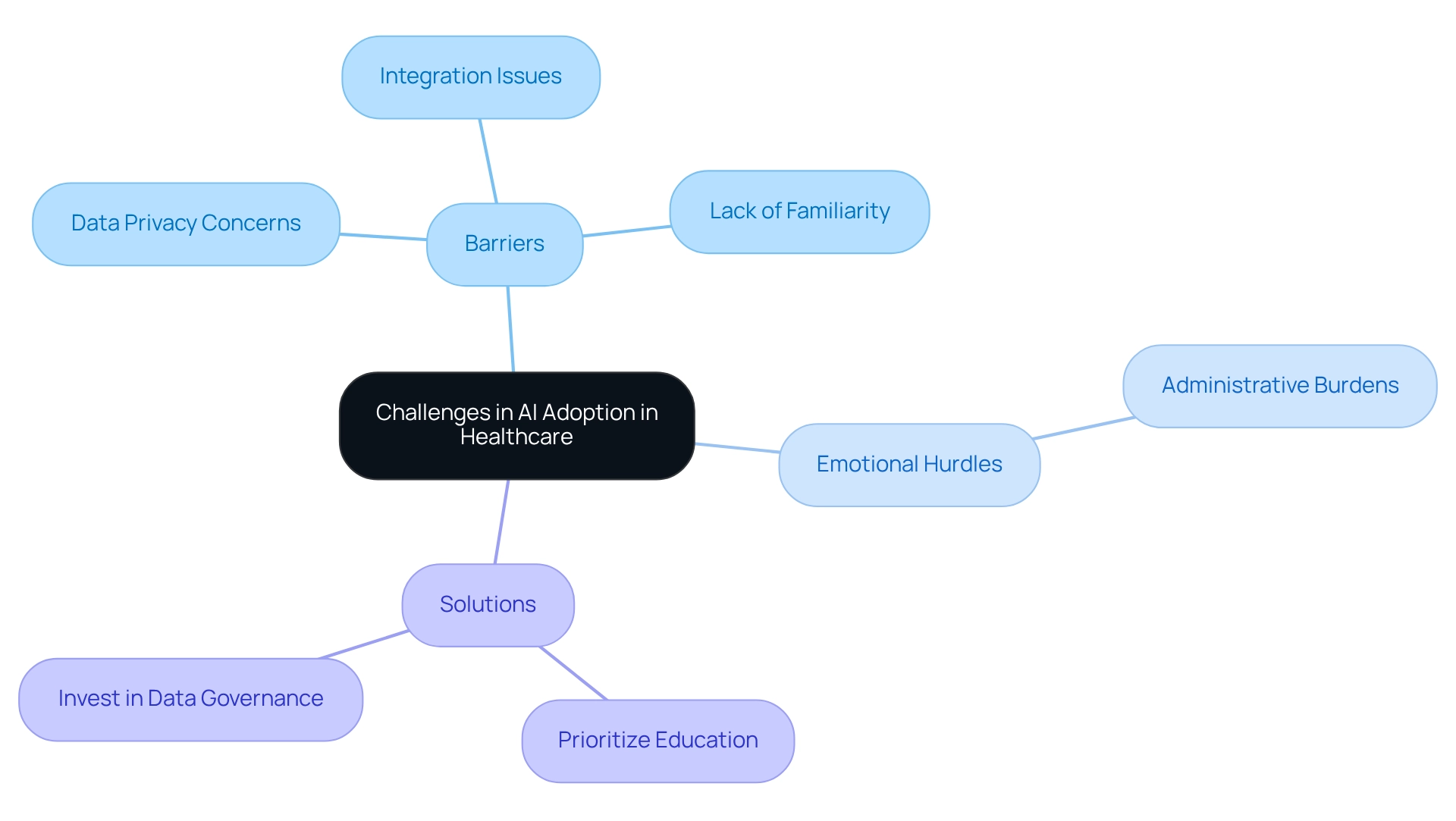
Case Studies in AI Success: Learning from Effective Implementations in Healthcare
Examining case studies of in the medical field reveals valuable insights into best practices and strategies. Organizations like [specific organization] have effectively integrated AI tools for triage and diagnostic support. This integration has resulted in improved efficiency and satisfaction among individuals, showcasing the potential benefits of innovation.
However, many healthcare providers face emotional challenges, as a significant portion of the medical sector remains resistant to change. Doctors often express concerns about maintaining the quality of care and patient interactions. Addressing these worries is essential for medical providers eager to adopt AI technologies. How can we ensure that innovation complements patient care rather than complicates it?
Furthermore, traditional accelerators frequently lack the necessary support for healthcare startups, which can hinder their ability to innovate. By learning from successful examples and understanding the challenges faced by these startups, organizations can better navigate the complexities of AI integration. This journey not only enhances care delivery but also fosters a nurturing environment for both patients and providers.
Let’s embrace the opportunity to learn from these success stories and support each other in overcoming the barriers to innovation. Together, we can create a more efficient and compassionate healthcare system.
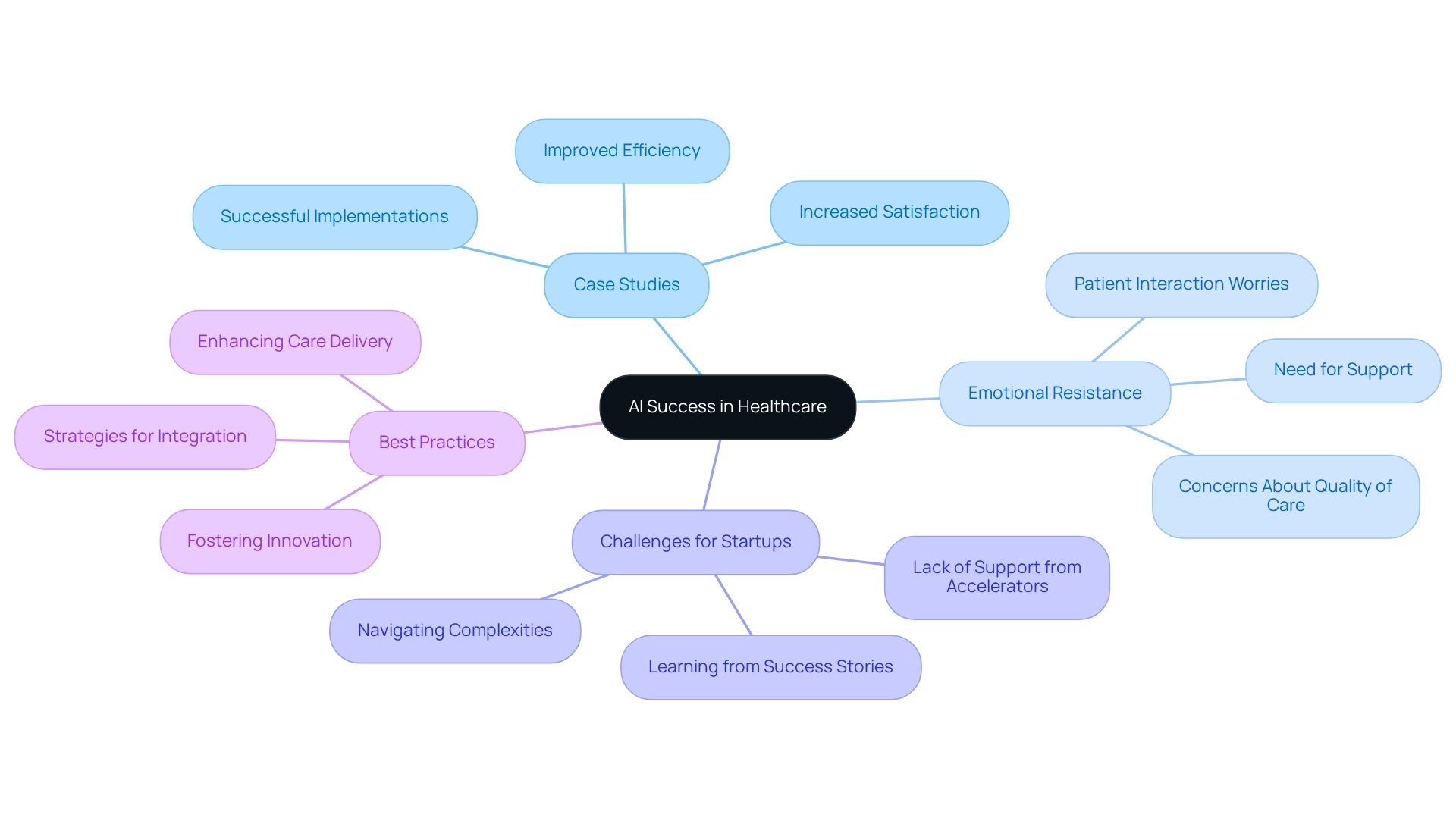
Conclusion
The integration of artificial intelligence in healthcare represents not merely a technological shift but a transformative movement that enhances patient care while alleviating administrative burdens. Organizations like CosmaNeura and Duke AI are at the forefront, developing platforms that ease the workload on healthcare providers, enabling them to concentrate on delivering compassionate care. These innovations promise to improve operational efficiency, enrich patient interactions, and ultimately lead to better health outcomes.
Yet, the path toward successful AI implementation is not without its challenges. Ethical considerations, data privacy concerns, and the necessity for user-centered design must be addressed. Establishing robust ethical guidelines is essential for nurturing trust between patients and healthcare professionals. By prioritizing these values alongside technological advancements, healthcare organizations can ensure that innovations align with the core mission of patient care.
As the healthcare landscape evolves, it is vital to embrace AI's potential while addressing resistance to change. The future of healthcare innovation hinges on the ability to seamlessly integrate AI into clinical workflows, optimize billing processes, and enhance telehealth interactions. By learning from successful case studies and tackling the barriers to adoption, healthcare providers can navigate this complex landscape and elevate their delivery of care. The focus must remain on fostering a compassionate environment that values both technology and the human element, ensuring that every advancement ultimately serves the best interests of patients.




